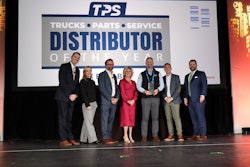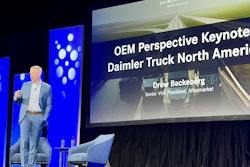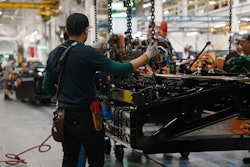Strong managers develop numerous innovative ways to give their companies’ market fortitude and edge, but worst-case scenarios don’t usually factor into a business plan. Unfortunately for the independent distributor or repair garage owner, disaster can arrive by several different roads. A brake repair gone wrong might cause an accident and bring about an attendant lawsuit with costly litigation. A mishap in the shop could seriously injure a technician. Fires, hurricanes, tornadoes and hail are all ways nature makes itself a costly business partner.
A mishap in the shop could seriously injure a technician. Fires, hurricanes, tornadoes and hail all are ways nature makes itself a costly business partner.
Fortunately, the same smart business development strategies a manager employs to make his company more profitable also can mitigate insurance expenses. Best practices and diligent attention to work environment not only make a garage or shop more appealing to customers, but also prove to insurance carriers that your business would be a low-risk client, which can net a distributor a better rate. Performing due diligence when selecting an insurance carrier and conducting business conscientiously unfortunately don’t always protect a distributor from disaster, but it can ensure that he or she is financially protected should an accident occur or bad weather come calling.
THE RIGHT AGENT FOR THE JOB
Selecting a knowledgeable insurance provider can make or break an independent business, and this is especially true for aftermarket operations and their unique set of exposures. If you’re suffering recurring chest pain, your family doctor might be able to help you in a pinch, but you probably ultimately would want to solicit a cardiologist’s advice. Similarly, while many insurance companies could underwrite coverage for your business, you’d be better off seeking a specialist – someone who understands the heavy-duty aftermarket, inside and out.
Insurance companies can be divided roughly into two groups: Independent (or non-captive) and captive. Independent agents can represent many different carriers and products, while captive agents usually are tied to one specific carrier and can only offer its products.
There are benefits and drawbacks to both kinds, but the most important thing a business owner can do is to make sure the agency he chooses has a solid reputation in the aftermarket.
“I think considering agency experience is very important when selecting insurance,” says Jeff Kweder, vice president of marketing, Shepard Insurance Group. “Make sure you understand how old the agency is and how long it’s worked in the garage and distribution business.
What’s its reputation? Does it have a large book of business that specializes in that field? There’s more to buying insurance than just finding the lowest price. You need to be certain that the person you’re working with has a full grasp of what your exposures are and covers them cost-effectively, but also with the right products.”
In other words, do your homework. The independent aftermarket is built on a strong network of relationships; use your connections to get recommendations for insurance agencies that have underwritten similar businesses.
“Once you start saying that your [business is] trucks, a lot of insurance guys get worried and immediately classify you as high risk,” says Marc Karon, president of Total Truck Parts, West Palm Beach, Fla. “Focus on a big agency. Focus on somebody who is in the industry. I think they can do a better job for you than a small agent down the street.”
Gerry Cecil, national director of field marketing for Zurich NA Commercial’s Direct Market unit, agrees. “Any time a claim occurs it’s a very serious matter. You want to make sure you have people involved who know and understand the business. All carriers are not the same. For example, writing a heavy-duty truck operation is significantly different than writing a private passenger light-truck operation.”
When looking for a provider, use all available resources. Heavy-duty aftermarket marketing groups, for example, can be good sources of information for a distributor shopping for insurance. “HDA has an insurance program for our members that utilizes the same philosophy as HDA itself,” says Pat Biermann, president, HD America. “We get our members better pricing using our group buying power and we have a broker who specializes in the heavy-duty truck parts industry. Our broker has the facilities to either provide the necessary coverage for our members, or he will serve as their risk manager in guiding them through the insurance process.”
VIPAR Heavy Duty also makes insurance provider recommendations for its stockholders. “We recommend the Hylant Group as part of what we call ‘Business Services,'” says Jeff Paul, director of marketing for VIPAR Heavy Duty. “Our goal with our business services is to find good providers of services, and to put together a program that delivers added value for our distributors while minimizing their need to start from scratch in finding these providers.”
If an insurance agent cannot speak specifically about your market niche, the experts advise steering clear. Because insurance is a large cost of doing business, the temptation to cut corners and jump at low price offers is ever present. Before grabbing at a bargain price, consider what having inadequate coverage could cost your business. Most importantly, don’t hesitate to ask questions.
“Ask, ‘what kind of experience do you have in my business?,'” advises Cecil. “‘Who else like me do you insure? Do you have a list of references or referrals? What associations do you work with?’ Find out if they can walk the walk as well as they talk the talk.”
IT PAYS TO STAY PUT
Once you do research and find a quality insurance carrier who knows the truck parts business, stick with them – within reason, of course.
“I know businesses that had to close because they couldn’t get insurance,” says Karon. “We’ve always had the philosophy of first, get a very strong agent. Second, we deal with only the best A-rated companies so that we know they’re not as volatile or likely to pull out because they run into economic problems. The third thing we always do is that we try to stay with the same insurance carrier as much as possible.”
Karon knows what he’s talking about. Total Truck Parts, with five locations in Florida, has successfully weathered four hurricanes with only minor insurance increases. “A lot of our friends and competitors had rates double and triple,” he says. “It’s very important to build a relationship with the carrier. When insurance companies look at [your business], if you’ve been with them for four or five years and now have a claim, you’re much more likely to keep the company than if you’ve only been with them for one year.”
The insurance industry, like the trucking industry, is cyclical. Insurance is said to go through hard and soft cycles. In soft cycles (the current state of the industry), agencies can offer lower prices and have more liberal selection criteria. It’s now that carriers may experiment with writing coverage for smaller, niche markets, such as the heavy-duty aftermarket. But when the industry hardens and prices rise, many carriers will tighten their belts and drop those niche markets.
“When the market is soft you have more carriers entering a marketplace with a desire to write business of any kind. They aren’t quite as disciplined,” says Cecil. “But when the market hardens, the carriers who were operating as opportunists, trying to write business based on the margins rather than solid underwriting, will leave. And that can leave a business owner in a bind.”
No one recommends sticking with a sub-par carrier or one whose rates are far above market. If, however, you have formed a good relationship with a carrier during the soft market and not jumped providers too often in search of a bargain price, you stand a better chance of retaining coverage at a good price when the market hardens.
Staying with the same carrier provides a second benefit in that the longer an agent spends learning your business, the more accurately he or she can recommend the right products. It might cost you a bit more in this soft market to work with a quality carrier who has longevity, but when the market hardens, you will reap the rewards.
“The better accounts with agents who understand the risks are going to get better results when the market hardens,” predicts Kweder. “It’s not like today where everyone is getting good prices. There’s going to be a differentiation in the future where quality distributors are going to get good results and the other distributors are going to have to supplement those.”
WHAT YOU NEED, WHAT YOU DON’T
Based on business profiles and locations, distributors have different insurance needs. Does your company offer mobile maintenance? Is your biggest customer a fuel-hauling fleet? Are you located in an area prone to hurricanes? Do you conduct employee drug testing? How many service bays do you have? All these questions help an informed insurance agent pinpoint your unique exposures and write adequate coverage. Because aftermarket distributors and repair garages offer such varied services, it is impossible to create a universal list of necessary products. However, there are certain methods to the madness that distributors and agents should consider when selecting appropriate coverage at the best price.
“It’s the job of insurance professionals to educate clients on what their real, true needs are and to deliver those needs cost effectively as well as from a comprehensive coverage perspective,” says Kweder. During the underwriting process, an agent should ask numerous questions about your business. The more accurately you answer his or her questions, the more adequately you will be covered. It’s vitally important to identify all your assets and exposures. During this process, communication between agent and client is of paramount importance.
Determining the value of the building is one area where miscommunication can be costly. “So often a business owner fails to get the correct appraisal price for his building. He needs to properly insure his building according to what it will cost to replace it with like kind and quality. Zurich appraises its customer’s property to insure he is getting the appropriate amount of coverage,” says Cecil. “And if he doesn’t insure it for the appraisal price and instead insures it for what it’s being carried on the books or the purchase price, after a loss occurs, the owner may find that he has inadequate limits for the loss.”
Coverages that most distributors and service garages will need include garage keepers insurance, liability, business continuation, workers compensation and an umbrella policy, which offers coverage for any costs over and above the limits of an underlying policy.
Consider too, that having sufficient insurance coverage not only protects your business from losses, but is also a way you can take care of your customer. An example of how your insurance can be used as a selling point to your customers is through your garage keepers policy.
“One of the biggest coverages for this industry is garage keepers,” says Kweder. “This covers a customer’s vehicle when it is in a distributor’s care, custody and control, whether a technician is working on it or test driving it.
“From my perspective, the most comprehensive way to cover this exposure is what we call direct primary coverage, which means that while the vehicle is in the client’s control, regardless of what happens, they’re responsible for any liability.” Sometimes, according to Kweder, a shop will select legal liability only coverage, which is less expensive, but occasionally problematic should a claim occur.
This coverage only pays for damages for which the distributor can be held legally responsible, but excludes things like vehicle theft or weather damage. In these situations, the customer’s insurance would have to pick up those expenses.
“This can cause a good deal of animosity between the clients, the customer and the vendor,” warns Kweder. “And when those premiums are close, normally you want to give your customer a better opportunity for them to not have to use their own insurance.”
Business continuation, or business interruption insurance, is another way you can assure your customers that you will be able to take care of their needs, even if a natural disaster forces you to temporarily shut your doors.
“If you shut down as a business for any period of time, you have certain ongoing expenses,” says Cecil. “You will have gross profit that is going to be missed while you’re in the process of rebuilding. You may want to keep key employees. Business interruption coverage can take the form of replacement of gross profits, including employee payroll, or it can take the form of extra expense coverage, which provides for the shop owner or distributor to relocate and operate from another facility. Getting the proper building, stock and equipment coverage is one thing, but then you have to go a step further and make sure you have the proper business interruption coverage.”
In today’s market, the value of attracting and retaining both key customers and employees cannot be overstated. Carrying a responsible amount of insurance is a pledge to your market that you will be there, through good and bad. The confidence this inspires is a strong selling point.
KEEPING INSURANCE AFFORDABLE
Covering myriad exposures adequately can, unfortunately, be an expensive proposition, but there are proactive measures a distributor can take to lower his premiums. Most of the actions are tied to best practices, which will not only benefit a distributor by putting a dent in premiums, but also by improving his business and making the workplace a more attractive environment for valued employees.
“It’s beneficial for a client to have a fundamental understanding of insurance, and I think most heavy-duty people do,” says Cecil. “They understand catastrophic exposure and thus they can handle frequency and smaller claims. If they properly set up their program and take higher deductibles, they can benefit significantly.”
One of the largest insurance expenses for a distributor who conducts service work is workers compensation, or workers comp. These rates are calculated based on the level of risk of a particular line of work and an employee’s salary. Someone working in accounting, for example, has a much lower associated risk than a technician working on diesel engines.
Certain training programs can help mitigate insurance costs. “We’ve had cases where we’ve managed to drive down premiums by 40 or 50 percent over a three or four year period because of proactive workers compensation specific loss control features,” says Kweder. “On the garage and liability side, there are a number of training practices in the industry and accreditation programs that can help your credibility. Also, a clean, safe work environment is important. A lot of insurance writing is premise driven. If an inspector sees a premise is organized, clean and that the owner has a systematic approach to conducting business, they normally will get a very favorable renewal or new business offer from an insurance carrier.”
The benefits of having organized and clean facilities also apply to neat record keeping. These strong business practices may contain hidden insurance savings. When it comes to possible ways to reduce insurance premiums, leave no stone unturned.
For example, making sure you have your best drivers make deliveries or test-drive customer vehicles can make a significant positive impression on an insurance carrier. “Depending on what kind of driving exposure you have, running annual motor vehicle reports on employees to make sure you have the right drivers on the road could be important,” says Kweder. “And if the garage or distributor is large enough, we may recommend things like pre-employment physicals or post-accident investigation to verify that the driver wasn’t intoxicated.
“These checks and balances are normally reserved for larger risks because there is some expense associated with that at the carrier level. But good agencies will try to partner and defray some of those costs from the distributor and onto the carrier because these agents know that if they do those things on their client’s behalf, they’re going to get favorable results on loses, which eventually will drive down premiums. Then everybody wins.”
There’s a good deal of salesmanship that goes into positioning your business in a positive light for an insurance agent. Small details can make big differences. Karon, for example, constructs his buildings to exceed insurance code.
“When we construct a building, the insurance code may say that our doors have to be rated to withstand 125 mph winds. We build them to withstand 150 mph winds. We find that the small cost increase on the building conveys our approach toward being safe and overly conservative in terms of making sure our buildings don’t go down. And that’s worked well for us. Part of it is the salesmanship,” says Karon. Showcase your business for an insurance agent as you would for your best customer.
Insurance agencies often will provide a checklist of items they will need to see when visiting your grounds to conduct an assessment. Having everything ready will save precious time during the visit and allow you to spend more time highlighting what you do well. The same attention to details that makes a company successful may result in lower premiums.
SLEEPING EASY
Because aftermarket distributors and repair operations come in all shapes and sizes and offer varied services, there’s no such thing as a one-size-fits-all insurance recommendation. Make sure your facilities are adequately covered and insured to their full value. You must protect your employees through workers comp and protect your customers’ vehicles with garage keepers and liability insurance. An umbrella policy with proper limits can be a lifesaver. But all these coverages will vary from business to business.
Assigning certain values to different business aspects can be a mind-numbing exercise, but a knowledgeable, reliable agent will help you through the process. Sometimes values are subjective. There might be accidents that no amount of insurance can cover, or fires that destroy a huge amount of property and inventory. Business owners can become insurance poor if they set deductibles too low or try to cover too much. This is a real risk that must be addressed with a carrier.
When all is said and done, however, the correct amount of insurance coverage is a comfort issue. “Take as much deductible as you feel comfortable with,” recommends Cecil. “You typically are going to be rewarded for taking a higher deductible, and by controlling your own actions, you can control your exposure. Limits are a function of what you need in order to be able to sleep at night.”
Risky Business
The following is a list of some questions whose answers could affect your policy limits and deductibles. Be sure to discuss your answers with a well-qualified agent who knows and understands risks specific to the heavy-duty aftermarket.
- Do you have environmental exposures through such services as mobile oil changes or roadside repair vehicles?
- Have you adequately insured all your expensive electronic diagnostic equipment and other repair tools?
- Does your business keep customers’ vehicles in a safe and secure location, or are they targets for vandalism and theft?
- Have managers at your company undertaken the appropriate discrimination and harassment training?
- Do you provide a safe, well-lit, clean working environment?
- Have you considered all hidden rebuilding costs when insuring your buildings? If you have to rebuild, you might need to spend extra money bringing facilities up to modern specifications in compliance with the Americans with Disabilities Act.
- Are you a brand-name distributor? If so, can you get your suppliers to indemnify you in the event that one of their parts fail?
The Internet
From the advent of online training and certifications to your company’s website, the Internet can play a part in determining your insurance premiums.
The Internet and business websites have opened doors for insurance carriers who are considering clients. “Many business owners, whether they realize it or not, are making themselves more marketable or available via the information shared on their websites,” says Gerry Cecil, national director of field marketing, Zurich NA Commercial’s Direct Market unit. “If you go to some sites, you can see a slideshow of what the company is doing and of what it’s particularly proud. That serves as one set of eyes and ears for an insurance underwriter looking at your operation.” Therefore, it behooves a distributor to make sure he’s presenting his company in the best possible online glow.
The advent of online technology has enabled technicians and managers to complete training programs via the Internet. During the assessment process, make sure you let your agent know about any safety certifications or discrimination training you or your employees have completed online. The successful completion of these training modules may take a bite out of your premiums.
Internet Guide
To help you find aftermarket products and services online from leading suppliers in the heavy-duty industry, Truck Parts & Service offers this listing of companies that have websites.
Alliance Brand Parts
Daimler Trucks North America LLC
www.alliancebrandparts.com
Allison Transmission
www.allisontransmission.com
ArvinMeritor, Inc.
www.meritorhvs.com
www.XPresswayPlus.com
Av-Tekk/Diesel Injection Service
www.av-tekk.com
AxleTech International
www.axletech.com
Baldwin Filters
www.baldwinfilter.com
Bee Line Co. Inc.
www.beeline-co.com
Bendix Commercial Vehicle Systems
www.bendix.com
BorgWarner Turbo Systems
www.turbos.bwauto.com
BrakePro
www.brakepro.com
Chevron Products Company
www.chevron.com
Cummins, Inc.
www.everytime.cummins.com
Dana Heavy Vehicle Technologies & Systems Service
www.dana.com
Donaldson
www.donaldson-filters.com
Duroline SA
www.duroline.com.br
Eaton Corp.
www.roadranger.com
Grote Industries
www.grote.com
Hendrickson
www.hendrickson-intl.com
Hengst Filters
www.hengst.com
Hunter Engineering Co.
www.hunter.com
Interstate-McBee
www.interstate-mcbee.com
Karmak, Inc.
www.karmak.com
Luber-finer/Champion Laboratories
www.luber-finer.com
Mahle Clevite
www.clevite.com
Old World Industries
www.finalcharge.com
Peterson Mfg. Co.
www.pmlights.com
PPG
www.ppgcommercialcoatings.com
ProDiesel
www.dssprodiesel.com
Shell Lubricants
www.shell-lubricants.com
Spray Control Systems
www.minimizer.com
The Timken Company
www.timken.com
Tracer Products
www.tracerline.com
VIPAR Heavy Duty
www.vipar.com
Whelen Engineering
www.whelen.com
Zurich
www.zurichins.com/zdu







